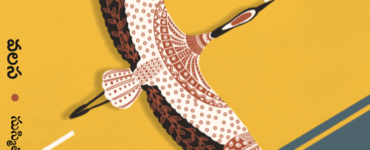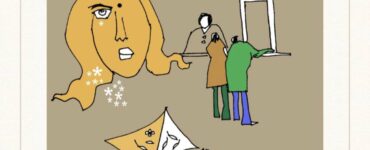Roopa’s first encounter with Noel was on a cold, drizzly afternoon in October. Roopa moved to London for the further studies like the rest of her friends.
Roopa was walking along the South Bank of the River Thames, marvelling at the majestic beauty of the cityscape. The Shard pierced the heavens, the London Eye spun like a slow-moving planet, and the Tower Bridge stood as a symbol of history and modernity intertwined . It was against this backdrop that Roopa noticed a body. His frail form sat hunched against a crumbling brick wall, a tattered blanket wrapped around his shoulders, and an empty coffee cup at his feet. His eyes, clouded with the weight of years gone by, stared into the distance, seemingly detached from the world.
Curiosity piqued; Roopa approached the shivering soul. As Roopa approached, she noticed the faded remnants of paint splatters on his ragged coat. The gentleman’s silver hair was matted and tangled, and his fingers were gnarled like the roots of an ancient tree. The wrinkles etched on his forehead told tales of the burdens he had carried, and the tiredness in his eyes spoke of a spirit long worn down by the trials of life.
“Excuse me, sir,” she began hesitantly, “Are you alright?”
His response was slow and his voice, raspy, as if it hadn’t been used in a long time. “Just another day in this cruel city, lass. His words hit her like a sledgehammer. She had assumed that London, with its prosperity and glamour, would be immune to homelessness. Yet, here was a man who had once been an artist celebrated by the world, reduced to a forgotten relic of the past. She left after hearing his answer.
Days passed, and she saw him in the same spot, day in and day out. For nearly a week, she watched him sit there, a beggar by the station’s entrance, a sad relic of a life that had crumbled into oblivion. It looked like the city buzzed with life around him, indifferent to his presence. She would see him on the same street corner daily, cupped hands outstretched, begging for spare change. She initially looked at him with indifference, like many others who simply passed by without a second glance. She felt a pang of guilt each time she walked by, sweeping up in the fast-paced rhythm of life in London. But one day, something changed within her, perhaps triggered by the biting cold of the London winter, or maybe it was that spark in his eyes that refused to be extinguished.
“Excuse me, sir,” she began without hesitating this time, “May I sit with you for a moment?”
His eyes, once distant, flickered with surprise as he nodded slowly. With caution, she settled beside him on the cold pavement, trying to ignore the curious glances from passing strangers.
“Have you been sitting here long?” she asked, her voice carrying a hint of concern.
He sighed, his voice trembling with age and vulnerability. “It’s been more years than I can count, young one.”
She introduced herself and asked about his life. He hesitated for a moment, then began to share his tale. Noel had once been a painter with extraordinary talent. He spoke of a time when his days were filled with the smell of oil paints and the stroke of brushes on canvas.
They used to call me the ‘Invisible Artist,'” he said, a faint smile gracing his weathered face. “My paintings adorned these very streets, but people only saw the art and never the artist.”
With a sense of pride and sadness intertwined, Noel pointed to the beautiful murals and paintings that adorned nearby buildings. Crowds of tourists snapped photos of these vivid works, oblivious to the man who had created them.
“Those were my creations,” he whispered, his voice barely audible over the city’s cacophony. His eyes gleamed with nostalgia as he told Roopa about the canvases he had transformed into masterpieces, the walls he had adorned with vibrant colours and intricate designs.
“But they belong to the world now, and I am just a forgotten soul.”
Noel spoke of the days when he had revealed the joy of creation when fame had knocked on his door. He recounted being interviewed by news channels, his name a sensation in the art world. But as he spoke, it was clear that those days were long gone, buried beneath the rubble of a life that had taken a painful turn.
Tears welled up in her eyes as she listened to his poignant story. She couldn’t do anything but feel a surge of empathy for this man who had once painted beauty into the world, only to find himself painted over by the indifference of time.
Noel’s body showed the unmistakable signs of life on the streets—his hands, once nimble, were now gnarled, and his skin bore the marks of harsh weather. Yet, his spirit, though fragile, still clung to the memories of his artistry.
They talked for hours, about his dreams and the life he had lost, about the changing city that had moved on without him. She couldn’t help but wonder how many other hidden stories existed in the shadows of this bustling city.
Noel’s tale intrigued her long after their conversation ended, and she couldn’t walk by him with indifference anymore after that. She started to bring him warm food whenever she could. Through their interactions, she learned that sometimes life could be a cruel and capricious painter, splashing dark hues on the canvas of even the most vibrant souls. As the days rolled on, his presence became a regular fixture in her daily routine, an ever-present reminder of the stark realities that often remained hidden in the bustling metropolis.
In that fleeting connection between a student and a homeless painter, I discovered the profound beauty of human resilience. Noel, the forgotten artist of London’s streets, reminded me that every person, no matter how weathered and worn, carries a story worth hearing, a life worth acknowledging, and a spark worth rekindling.
*









Very touching story.